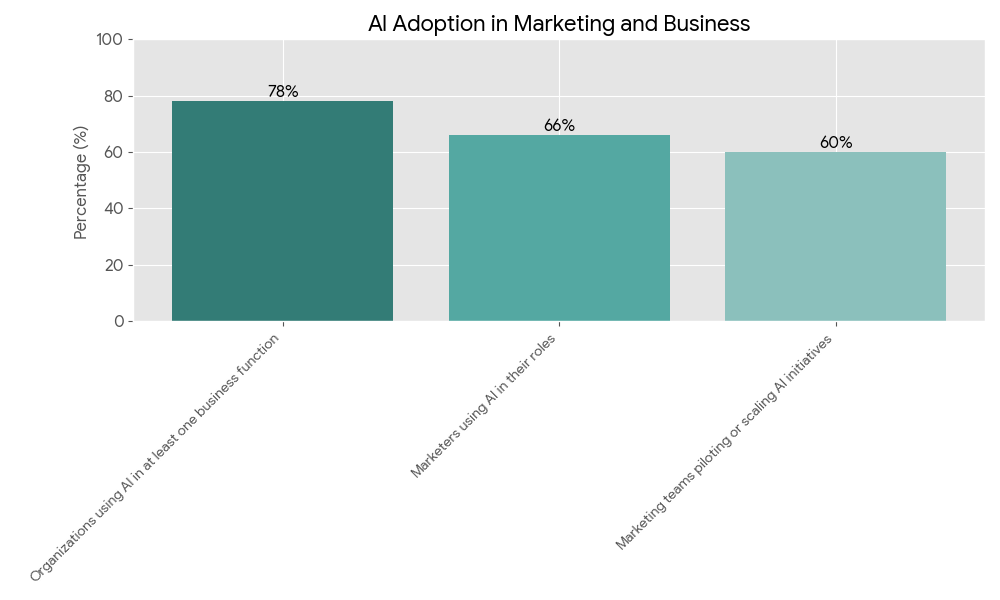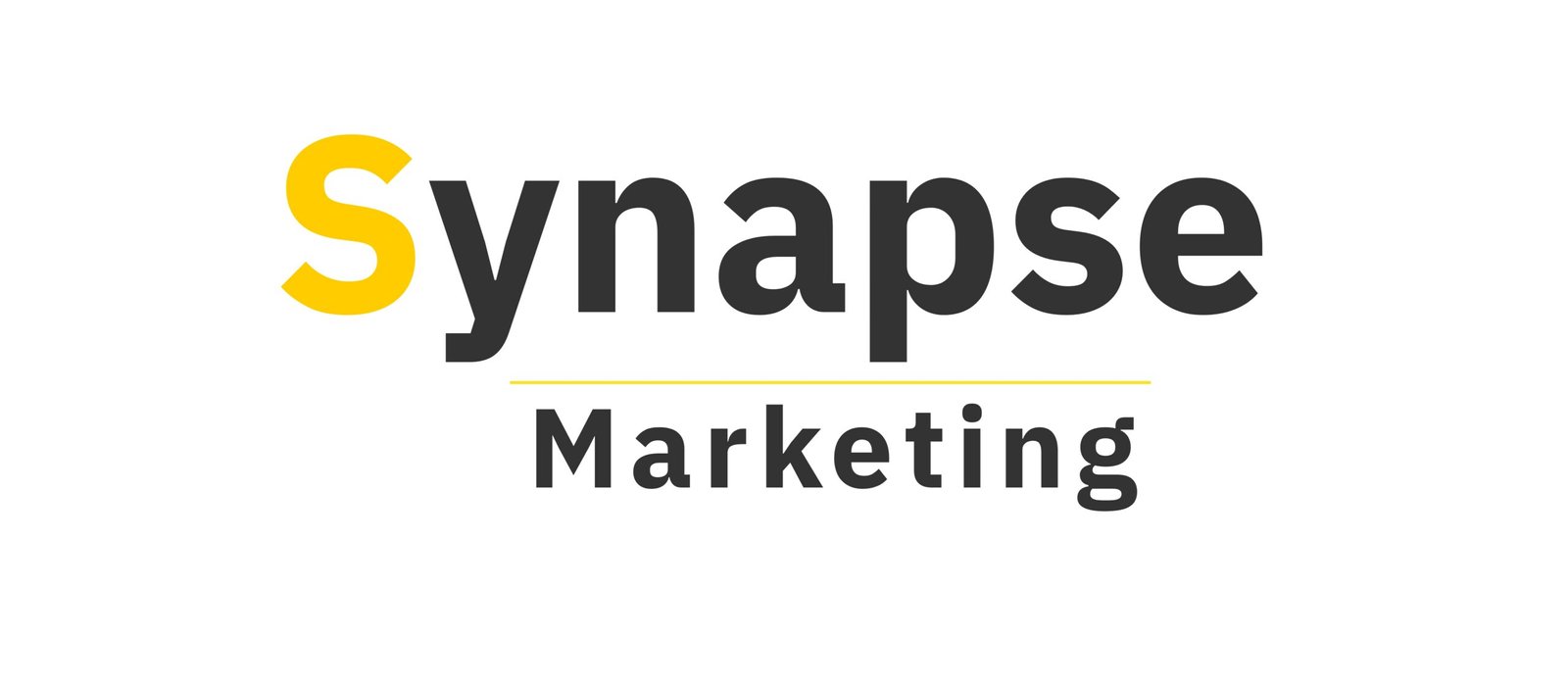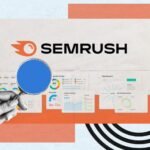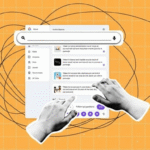AI in Digital Marketing is the application of artificial intelligence—machine learning (ML), natural language processing (NLP), computer vision, and large language models (LLMs)—to analyze customer and market data, automate decisions, and generate or personalize content across channels. In practice, it helps marketers identify patterns in signals (such as clicks, searches, and purchases), predict outcomes (propensity to buy or churn), and deliver the next best action at speed and scale.
Crucially, AI marketing differs from simple “if-this-then-that” automation. Rule-based systems follow static instructions; AI systems are trained on historical data to learn relationships, update probabilities, and improve as feedback arrives. That learning loop is what enables smarter targeting, creative iteration, and budget allocation over time.
You’ll see artificial intelligence in marketing in everyday workflows:
- Automated audience discovery and bidding in ad platforms
- SEO topic clustering and internal linking recommendations
- Send-time optimization and subject line testing in email
- On-site search and chat that resolve questions and hand off to sales
- Generative AI that drafts copy, images, or video variants for human review
These capabilities compress cycle times and raise test velocity, which is why many teams are expanding investment in 2025.
Key Distinction: Generative models create new content; predictive models forecast outcomes and recommend actions. Most mature stacks use both—gen-AI to scale creative and predictive analytics to decide who should see what and when.
Adoption, Performance & Expectations

AI has moved from pilot projects to standard operating procedure. In 2025:
- 66% of marketers say they already use AI in their roles
- 60% of marketing teams report they’re either piloting or scaling AI initiatives
- 78% of organizations now use AI in at least one business function, with marketing and sales among the most active adopters
Why Adoption is Rising
The business case is clearer. Marketers say the top outcome they pursue with AI is time saved on repetitive work—freeing capacity for strategy, creativity, and testing velocity—and nearly three-quarters of leaders who’ve invested report positive ROI.
Customer Expectations
Trust is fragile—and decisive. In Salesforce’s 2025 State of the AI Connected Customer:
- 71% of customers say a human should validate AI outputs
- Trust in companies’ ethical use of AI remains below half
Takeaway: Combine automation with visible human oversight, transparent disclosures, and clear escalation paths.
How It Works for Marketers
The practical answer starts with a pipeline:
- Data Collection: Consented first-party data (site/app events, CRM, product catalog, creative performance) flows into a central store (warehouse or customer data platform)
- Feature Engineering: Teams engineer features and train models
- Production Deployment: Deploy models to production
- Continuous Monitoring: Monitor and retrain as data drifts
This end-to-end loop is called MLOps/ModelOps and turns experiments into reliable systems.
Model Types
Classification and Prediction: Estimate outcomes like churn or conversion
Forecasting: Projects demand or revenue.
Recommenders: Decide which product or content to show next
- Collaborative filtering (patterns from similar users)
- Content-based filtering (matching item attributes to user profiles) Large Language Models (LLMs): Interpret briefs, summarize research, and draft copy, images, and even basic code—under human review
Systems Architecture
From a systems view, AI in Digital Marketing is:
- Unify the data
- Pick fit-for-purpose models (predictive + generative)
- Wire decisions into channels
- Operate with MLOps plus human oversight
Use Cases Across the Funnel
Awareness: Find Demand and Shape It
Social Listening at Scale
- AI systems cluster topics, detect sentiment, and emotion
- Surface fast-moving conversations your audience cares about
- Turn noisy social data into weekly content ideas, FAQs, and ad angles
- Watch: Share of voice, brand mentions, sentiment trend, new topics discovered
Search Shifts
- Google’s AI Overviews/AI Mode requires being the clearest source worth citing
- Structured pages, tidy headings, evidence, and expert quotes
- Watch: Impressions in AI features, clicks from “AI Overviews,” and branded search growth
Acquisition: Scale Paid Performance
Performance Max (Google)
- Spans all Google inventory with deeper search reporting
- Campaign-level negatives, high-value new-customer goals
- Watch: CPA/ROAS, new-customer rate, search terms insights
Advantage+ (Meta)
- Automates targeting, placements, and creative selection
- Designed to maximize sales with fewer manual levers
- Watch: CPA/ROAS, new-customer rate, creative fatigue
Creative Iteration with Gen-AI
- Real-world A/B test on Facebook reported +6.7% CTR from reinforcement-learning–tuned ad text
- Watch: Performance metrics and creative fatigue
Conversion: Predict and Personalize
Recommendations
- Real-time recommenders raise AOV and conversion
- Match each visitor with relevant products or content
- Watch: CVR, AOV, cart adds, product view depth, assisted conversions
Propensity & Next-Best-Action
- Train models on first-party events to score purchase likelihood
- Trigger offers, bundles, or assistance at the right moment
Landing-Page Variants
- Model-guided copy/creative variants that respond to audience, device, and intent
Retention: Keep Customers Engaged
Churn Prediction
- Ensemble models flag at-risk customers
- Automate save-offers, concierge outreach, or education sequences
- Watch: Monthly churn, reactivation rate, email CTR/CVR, repeat purchase rate, LTV
Send-Time Optimization (STO)
- Choose each recipient’s best hour within a 24-hour window
- Based on engagement history
Loyalty & Advocacy: Service That Sells
AI Support
- Measure deflection rate (conversations resolved by AI without escalation)
- Reduce wait times and boost CSAT while holding accuracy
- Watch: CSAT, first-contact resolution, deflection %, upsell/cross-sell from service journeys
Channel-Specific Applications
SEO: Earn Visibility Across Results and AI Surfaces
Google’s stance is steady: the same SEO best practices apply to AI features like AI Overviews/AI Mode.
Do Now:
- Structure articles with concise headings, schema, and descriptive anchors
- Monitor how topics show in AI Overviews/AI Mode
- Expand sections that lack evidence, data, or clarity
Watch: Impressions/clicks from SERP features, internal link coverage, citations in AI summaries
Paid Media: Lean Into Platform Automation
Performance Max: Use it to find incremental demand, not replace intent-driven Search Meta Advantage+: Expect efficiency with less granular control; complement with lift tests
Watch: CPA/ROAS, new-customer rate, asset-level diagnostics, incrementality from geo/holdout tests
Content Marketing: Scale Quality, Not Volume
- Use generative AI to draft briefs, outlines, and first passes
- Editors add voice, evidence, and originality
- Treat AI as a copilot, not a content mill
- Google’s guidance remains people-first: rewarding high-quality content however it’s produced
Watch: Ranking stability after edits, backlinks earned, reader time-on-page and scroll depth
Email & CRM: Predict Engagement
Two Fast Wins:
- Send-Time Optimization: Mail each contact at their best hour
- Engagement/Propensity Scoring: Target segments likely to open/click/convert
Watch: Lift in opens/clicks vs. control, downstream CVR, unsubscribes by segment, fatigue
Social & Community: Listen, Detect, Respond
- Modern platforms apply AI to cluster topics, detect spikes, and summarize sentiment
- Use for briefing content, spotting product issues, and defusing crises
- Keep human review for claims and tone—especially on paid posts
Watch: Share of voice, sentiment trend, topic resolution time, assisted leads sourced from social conversations
Web & CX: Faster Answers, Smarter Recommendations
On-Site Features:
- AI-powered search, chat, and recommendations
- Measure deflection and AI-handled resolution
- Use agents as the front line with seamless human handoff
Watch: CSAT/first-contact resolution, deflection %, average handle time for escalations, revenue from service-to-sales handoffs
Generative AI in Marketing
Generative AI turns briefs into on-brand drafts, image and video variations, product descriptions, ad copy, and localization—fast—while your team supplies facts, taste, and approvals.
Pragmatic Workflow (Copilot, Not Autopilot)
- Brief → Outline → Draft: Start with clear brief, use model for outline and first pass, require human edits
- Variant Generation: Create multiple versions for channel fit
- Grounding & Fact-Check: Ground prompts in approved sources, require editor sign-off
- Compliance & Brand Voice: Run structured checklist
- Measurement Loop: Track lift per variant and feed results back into prompts
Where Gen-AI Shines
- Content Velocity with Quality: Draft briefs, outlines, intros, FAQs
- Versioning at Scale: Translate, localize, tailor by persona/industry
- Creative Testing: Rapidly generate compliant A/B/C variants
Essential Guardrails
Disclosure & Claims: Align marketing claims with evidence, avoid implying outcomes the product can’t deliver
Copyright & IP: In the U.S., human authorship is required for copyright; AI-generated portions may be excluded from registration
Quality, Bias, and Hallucinations: Keep human-in-the-loop for facts and sensitive topics
Search Integrity: Optimize for people-first value; clarity and credibility matter most
Data, Attribution & ROI
Treat measurement as three complementary layers:
1. Operational Analytics (Leading Indicators)
Use GA4’s Analytics Insights and anomaly detection to spot unusual trends and trigger root-cause checks.
2. Causal Impact (Incrementality)
Run controlled experiments to quantify lift:
- Google Ads Conversion Lift: Compares exposed vs. control groups
- Meta Conversion Lift: Similar framework to isolate incremental effect
3. Model-Based Views
- Marketing Mix Modeling (MMM): Uses aggregated data to estimate each channel’s contribution
- Attribution (MTA/DDA): Assigns credit across touchpoints
AI-Specific Metrics
Monitor:
- Time to publish
- Test velocity
- Model coverage (share of traffic influenced by predictions)
- Error rates (e.g., chatbot escalation rate)
ROI Formula
ROMI = (Incremental Revenue − Marketing Cost) ÷ Marketing Cost
Example: +5,000 incremental orders at $20 margin each on $50,000 spend ROMI = [($100,000−$50,000)/$50,000] = +100%
Tools & Platforms
Suites (MAP/CRM/CDP/Analytics Clouds)
Salesforce Marketing Cloud (Einstein/Agentforce)
- Native AI spans engagement scoring, send-time optimization, content selection
- If you’re already on Salesforce, start here to avoid data silos
HubSpot (Breeze/ChatSpot)
- AI assists with content drafting, prospecting, and forecasting inside the CRM
- Useful for SMB and mid-market teams
Adobe Experience Cloud (Sensei GenAI)
- GenAI features across AEM, Marketo, Analytics, and Journey Optimizer
- Best when you need enterprise governance and asset scale
Specialists (Plug the Gaps)
SEO & Content: Planners, brief generators, internal linking tools Paid Media: Platform AI like Google Ads AI Essentials / Performance Max and Meta’s automation suites Lifecycle & Service: STO and engagement scoring inside your MAP; AI agents for support.
Selection Criteria (2025)
Prioritize:
- Data interoperability with your warehouse/CDP
- Privacy and AI governance aligned to evolving laws
- Control/observability—clear logs, prompts, and rollback
Start with the AI you already own, add specialists where they outperform, and make governance a first-class requirement.
Implementation Roadmap (90–365 Days)
Days 0–90: Prove Value with Contained Pilots
- Stand up first-party data plumbing (events → warehouse/CDP)
- Pilot 2–3 “quick wins”: send-time optimization, recommendations block, internal research copilot
- Establish governance using NIST AI Risk Management Framework
Days 90–180: Industrialize What Worked
- Productionize pilots with SLAs, dashboards, and retraining cadences
- Adopt AI management system baseline (ISO/IEC 42001)
- Expand to paid media automation with lift tests
- Follow Google’s people-first content guidance
Months 6–12: Scale Responsibly
- Roll out next-best-action across CRM
- Broaden recommendations
- Introduce governed content copilot in CMS
- Formalize model and prompt lifecycle
- Map regulatory exposure (especially EU AI Act)
Takeaway: Ship a few wins quickly, measure incrementality, and codify governance early.
Risk, Ethics & Compliance
Anchor your program to three pillars:
1. Governance by Design
- Use NIST AI RMF to identify risks (privacy, bias, safety, IP)
- Set human-in-the-loop controls
- Create incident/appeal paths for customers
- Maintain decision logs and evaluation datasets
2. Management System & Audits
- Adopt ISO/IEC 42001 practices
- Maintain model cards for key systems
- Ensure roles, approvals, and monitoring are auditable
3. Track the Law
- EU AI Act is in force with phased application
- Most obligations apply by August 2, 2026
- Build compliance map (risk class, documentation, transparency)
- Monitor Commission guidance
Case Studies & Benchmarks
Conversational Support (B2B SaaS)
- Intercom’s Fin reports customers seeing 50–65%+ AI resolution rates
- Measure automated resolution, CSAT, and escalation accuracy
E-commerce Recommendations (Retail)
- Amazon Personalize case studies cite material lifts
- Example: Ticketek saw +49% sales per email open; +250% conversion rate
Storefront Discovery (SMB DTC)
- Shopify’s Search & Discovery app combines auto-generated with curated products
- Simple to implement and measurable against AOV and CTR
Lifecycle Engagement (B2C)
- Einstein Send-Time Optimization mails each contact during their best 24-hour window
- Use engagement scoring to prioritize segments
- Benchmark against holdout to confirm lift
Getting Started Checklist
- Confirm consented first-party data sources; define owner for data quality
- Pick two pilots: (a) STO in email/CRM and (b) PDP recommendations block
Draft one-page model card template (purpose, data, limits, metrics) - Implement human-in-the-loop reviews for outbound content or customer-facing agents
- Add GA4 anomaly detection alerts for revenue/CVR; create a weekly triage ritual
- Define success with incrementality (conversion lift or geo tests) before scaling budget
- Document AI governance baseline using ISO/IEC 42001 concepts
- Publish internal responsible-AI policy and disclosure guidelines
- Train editors and analysts on people-first content and citation standards
Frequently Asked Questions on What Is AI in Digital Marketing
Will AI replace marketers?
No. It accelerates research, production, and decision-making; humans provide strategy, brand voice, and governance.
Does AI-written content hurt SEO?
Google focuses on helpful, reliable, people-first content—regardless of how it’s produced. Human review, citations, and unique value remain essential.
How do I get included in Google’s AI Overviews/AI Mode?
There’s no special markup. Follow Search Essentials, structure content clearly, and support claims with evidence.
What should I measure for ROI?
Utilize GA4 anomalies for rapid signals; confirm their impact with lift tests and mix modeling; maintain daily tuning with data-driven attribution.
What regulations should I watch?
If you sell in the EU, plan for the AI Act phases through 2026–2027. Map transparency and documentation requirements now.
Conclusion
AI in Digital Marketing is a disciplined operating system for growth—predictive models to decide who/what/when; generative systems to scale creative; activation wired into your channels; and governance that keeps you accurate, compliant, and trusted.
Start with quick wins (STO, recommendations, an AI agent on FAQs), measure lift, then scale what proves out. Follow Google’s people-first content guidance to earn visibility in both classic results and AI surfaces. Use NIST/ISO guidance to keep risk in check, and plan early for EU obligations if you operate there.
Done this way, AI doesn’t replace your team—it multiplies it, and it shows up on the P&L.
References & further reading
- Google: AI features & your website; Creating helpful, reliable, people-first content. Google for Developers
- NIST: AI Risk Management Framework (AI RMF 1.0). NIST
- ISO: ISO/IEC 42001:2023 overview. ISO
- EU: AI Act application timeline. Digital Strategy EU
- Salesforce: Einstein Send-Time Optimization docs. Salesforce
- AWS: Amazon Personalize case study (Ticketek). Amazon Web Services, Inc.
- Intercom: Fin customer outcomes













